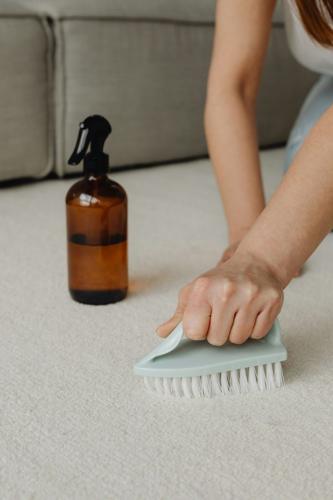
A spilled glass of wine. Muddy footprints from the back door. A surprise from your dog. Carpet stains happen—and they happen fast. Whether it’s a new home, a long-loved living room, or a rental you’re trying to keep spotless, knowing how to remove stains the right way can save time, money, and stress.
This guide walks you through how to get stains out of carpet using effective methods for fresh, set-in, and specialty stains. You’ll also learn how to prevent future messes and when it might be time to call in the pros or consider an upgrade.
First Things First: Understand the Type of Stain
Why Stain Type Matters
Before grabbing the nearest spray bottle, take a moment to assess what kind of stain you’re dealing with. Different substances require different treatments—and using the wrong method can make things worse. For example, water-based stains like juice respond well to gentle cleaners, while protein-based stains like blood need cold water and enzymatic products.
Equally important: know your carpet. Wool and natural fibers can react poorly to certain chemicals, while synthetic carpets are often more forgiving.
Common Stain Categories
Food and drink (coffee, wine, juice)
Pet messes (urine, vomit, feces)
Oil-based (makeup, grease, lotions)
Ink and dye (markers, pens, nail polish)
Dirt and mud (especially from foot traffic and pets)
The 5-Step Process to Remove Most Carpet Stains
Step 1 – Blot, Don’t Rub
The golden rule of stain removal: always blot—never rub. Rubbing pushes the stain deeper into the carpet fibers and can fray the fabric. Use a clean white cloth or paper towel to gently press and lift the spill until no more liquid transfers.
Step 2 – Apply the Right Cleaning Solution
For most common stains, you can start with a simple homemade solution:
1 tbsp dish soap + 2 cups warm water
Equal parts white vinegar and water
Baking soda sprinkled over the area, followed by a light mist of hydrogen peroxide
Store-bought carpet stain removers can also be effective. Just make sure they’re safe for your carpet type, and always test a small hidden area first.
Step 3 – Let It Sit & React
Don’t rush the process. Let the cleaning solution sit for 5 to 15 minutes so it can penetrate and break down the stain.
Step 4 – Blot Again and Rinse
Use a clean, damp cloth to blot away the cleaning solution. Repeat until no residue remains. Skipping this step can leave behind soap that attracts more dirt over time.
Step 5 – Dry Completely
Finish by blotting with a dry towel and setting up airflow (fans, open windows) to dry the area thoroughly. Avoid walking on the spot until it’s dry to prevent re-soiling.
Targeted Tips for Specific Stains
Coffee & Wine
Use club soda or a mix of vinegar and water to lift these tannin-heavy stains. Blot gently, and follow up with hydrogen peroxide if needed (avoid on dark carpets).
Pet Accidents
Use enzyme-based cleaners that break down proteins and eliminate odor. Never use heat or steam—this can permanently set the stain.
Ink, Makeup, or Oil
Blot the area with a cloth dampened with rubbing alcohol or acetone. Always spot test, and don’t over-saturate the carpet.
Dirt & Mud
Let mud dry completely before cleaning. Vacuum up as much debris as possible, then use a mild detergent solution to remove residue.
When to Call a Professional
Stains That Keep Reappearing
Some stains return after cleaning because the residue has soaked into the carpet padding. This is called “wicking” and usually requires professional extraction tools to resolve.
Delicate or Expensive Carpets
If your carpet is made from wool, silk, or other sensitive materials, don’t risk DIY damage. Pros have specialized products and techniques.
Annual Maintenance
Even if your carpet looks clean, an annual deep cleaning can extend its life, remove allergens, and meet warranty requirements.
When deep cleaning doesn’t do the trick—or your carpet is showing its age—Best Floor Coverings offers flooring solutions that range from stain-resistant carpets to hard-surface upgrades, helping homeowners balance style, durability, and easy upkeep.

How to Prevent Future Stains
Entryway Protection
The best stain is the one that never happens. Start by reducing what comes into the house in the first place.
One often overlooked way to reduce tracked-in dirt is to manage foot traffic outdoors. A secure perimeter, like one from a trusted Seattle fence company, can help keep pets contained and muddy paws off your carpet.
Pair that with durable doormats, no-shoes policies indoors, and regular vacuuming for best results.

Scotchgard and Carpet Protectants
After a deep clean, consider applying a carpet protector. These products help repel future spills and make spot cleaning easier.
Set Up a Regular Cleaning Routine
Vacuuming weekly, spot cleaning immediately, and scheduling professional deep cleans every 12–18 months are the keys to keeping your carpet looking (and smelling) fresh.
A Cleaner Carpet Starts With Smart Action
Stains are inevitable—but permanent damage doesn’t have to be. With the right tools, techniques, and quick thinking, you can tackle almost any mess your carpet encounters. Knowing your carpet type, choosing the right cleaner, and drying the area completely are the keys to success.
And when the time comes for something new, professionals like Best Floor Coverings and thoughtful upgrades like fencing from your local Seattle fence company can make your whole home easier to maintain—inside and out.







(0) comments
We welcome your comments
Log In
Post a comment as Guest
Keep it Clean. Please avoid obscene, vulgar, lewd, racist or sexually-oriented language.
PLEASE TURN OFF YOUR CAPS LOCK.
Don't Threaten. Threats of harming another person will not be tolerated.
Be Truthful. Don't knowingly lie about anyone or anything.
Be Nice. No racism, sexism or any sort of -ism that is degrading to another person.
Be Proactive. Use the 'Report' link on each comment to let us know of abusive posts.
Share with Us. We'd love to hear eyewitness accounts, the history behind an article.